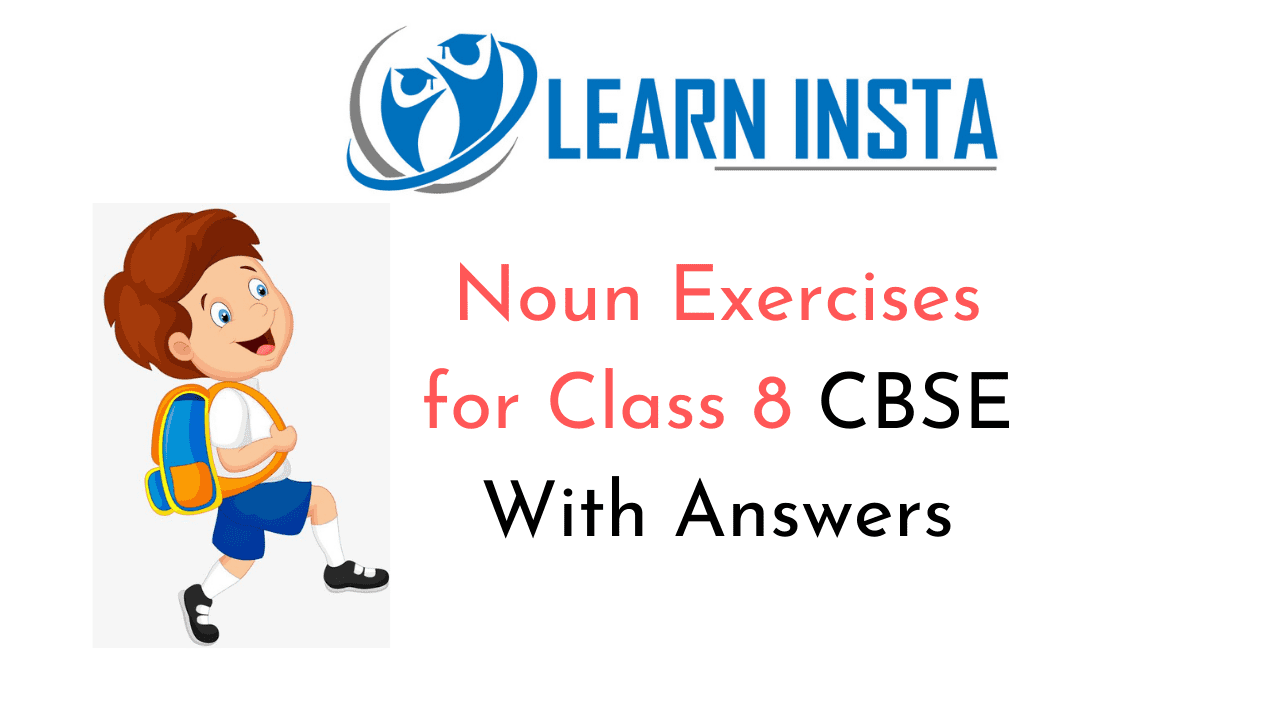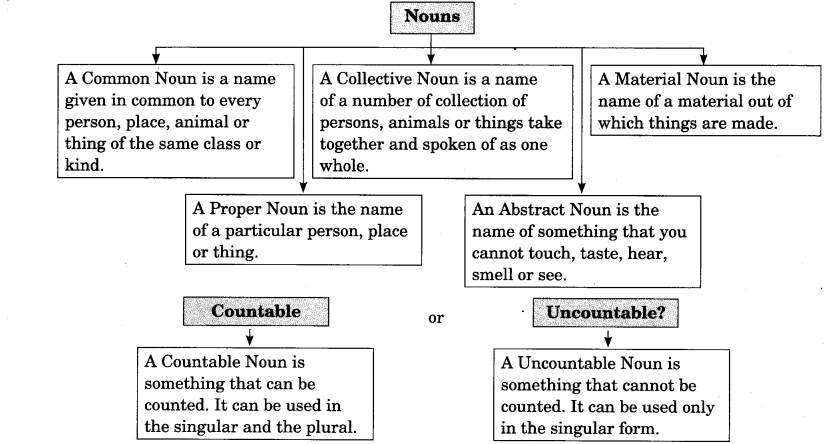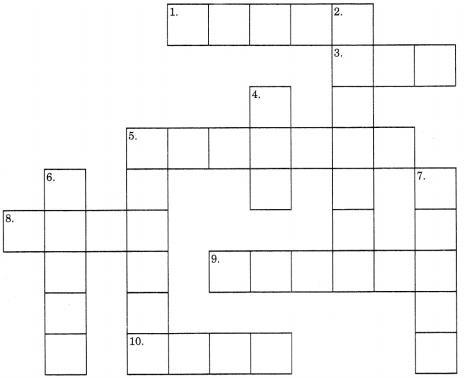
Definition: A noun is a part of speech that is used to name a person, place, thing, quality, or action. Examples: Mango, girl, boy, cat, etc.
Of all these parts of speech, nouns are perhaps the most important. A noun is a word that identifies a person, animal, place, thing, or idea. Here, we’ll take a closer look at what makes a noun a noun, and we’ll provide some noun examples, along with some advice for using nouns in sentences.
This grammar section explains English Grammar in a clear and simple way. There are example sentences to show how the language is used. NCERT Solutions for Class 8 English will help you to write better answers in your Class 10 exams. Because the Solutions are solved by subject matter experts.
Noun Exercises for Class 8 CBSE With Answers Pdf
There five types of noun, as follows:
- Common noun: A common noun is a noun that refers to people or things in general, e.g., boy, country, bridge, city, birth, day, happiness.
- Proper noun: A proper noun is a name that identifies a particular person, place, or thing, e.g., Steven, Africa, London, Monday. In written English, proper nouns begin with capital letters.
- Material noun: A material noun is a noun which refers to people and to things that exist physically and can be seen, touched, smelled, heard, or tasted. Examples include dog, building, coffee, tree, rain, beach, tune.
- Abstract noun: An abstract noun is a noun which refers to ideas, qualities, and conditions – things that cannot be seen or touched and things which have no physical reality, e.g., truth, danger, happiness, time, friendship, humour.
- Collective noun: Collective nouns refer to groups of people or things, e.g., audience, family, government, team, jury.
Plural Nouns
Most English nouns can be made plural simply by adding an “s” to them, but there are a few exceptions.
- Nouns whose singular forms end in s, z, x, ch, or sh need es to become plural (boss – bosses, box – boxes, watch – watches, bush – bushes).
- Certain nouns that end in o also need es to become plural (potato – potatoes, hero – heroes, volcano – volcanoes).
- For nouns that end in for fe, change the “f” to a “v,” and add es (knife – knives, wolf-wolves).
- If a singular noun ends in a single consonant followed by y, change the “y” to “,” and add es (lady – ladies, spy – spies)
Common vs. Proper Nouns
Common nouns are simply things that exist in mass quantities whereas proper nouns are names of specific things. For example, “building” is a common noun. There are millions of them in the world.
They’re common. However, the Empire State Building is the name of one specific building. There’s only one, and that’s it’s name. It’s a proper noun.
Common nouns are not capitalized (unless they begin a sentence, of course), but proper nouns are always capitalized.
Concrete vs. Abstract Nouns.
Concrete nouns are those that can be perceived with the five senses. If you can see, taste, smell, touch and/ OB: hear it, it’s a concrete noun. If it’s a concept or idea (love, peace, hate, justice) that cannot be perceived physically, it’s an abstract noun.
Possessive nouns
Possessive nouns can function in the same way as possessive adjectives and pronouns, but possessive nouns are simply nouns with ‘s or at the end to show possession. They’re still nouns, but they function as adjectives or pronouns depending on how you use them. A noun is any word that does one or more of these noun-y things.
Count and mass nouns
Nouns can be either countable or uncountable. Countable nouns (or count nouns) are those that refer to something that can be counted. Uncountable nouns (or mass nouns) do not typically refer to things that can be counted and so they do not regularly have a plural form.

Noun Exercises Solved Examples for Class 8 CBSE
Question 1.
Point out the nouns in the following sentences and say whether they are common, proper, collective, material or abstract.
(i) Jawaharlal Nehru was the first Prime Minister of India.
(ii) The boy was rewarded for his honesty.
(iii) He gave me an apple.
(iv) I recognized his voice at once.
(v) You should never tell a lie.
(vi) Wisdom is better than riches.”
(vii) He is on the jury.
(viii) Silver and gold are precious metals.,
(ix) Still, waters run deep.
(x) The cackling of geese saved Rome.
(xi) Tubal Cain was a man of might.
(xii) Old habits die hard.
(xiii) The early bird catches the worm.
(xiv) It was Edison who invented the phonograph.
(xv) You can’t pump the ocean dry.
Answer:
(i) Jawaharlal Nehru – proper noun; Prime Minister – common noun; India – proper noun.
(ii) Boy – common noun; honesty – abstract noun
(iii) Apple – common noun
(iv) Voice – abstract noun
(v) Lie – abstract noun
(vi) Wisdom – abstract; riches – abstract
(vii) Jury – collective noun.
(viii) Silver – material; gold – material; metal – common.
(ix) Water – common noun/material noun
(x) Cackling – abstract; geese – common; Rome – proper.
(xi) Tubal Cain – proper; man – common
(xii) Habits – abstract noun
(xiii) Bird – common noun; worm – common noun.
(xiv) Edison – proper noun; phonograph – common noun
(xv) Ocean – common noun
Question 2.
Read the following sentences. Underline the countable nouns and circle the uncountable nouns.
(i) He stored the information on his computer.
(ii) She spread the towel on the sand.
(iii) There is barely any furniture in the room.
(iv) The tired people sat down on the ground.
(v) An old song was playing on the radio.
(vi) The band played music all evening.
(vii) Freshly baked bread has a delicious smell.
(viii) He prefers to do his research on the internet.
Answer:
(i) He stored the information on his computer
(ii) She spread the towel on the sand room
(iii) There is barely any furniture in the room
(iv) The tired people sat down on the ground
(v) An old song was playing on the radio
(vi) The band played music all evening.
(vii) Freshly baked bread has a delicious smell
(viii) He prefers to do his research on the internet
Question 3.
Pick out the Nouns in the following sentences and say whether they are Proper, Common, Material, Collective or Abstract.
(i) Raman is a good boy.
(ii) One should believe in truth.
(iii) A soldier is respected for his bravery.
(iv) Ornaments are made of gold and silver.
(v) The case was decided by a bench of judges.
(vi) Mumbai is a big city.
(vii) The team won the match.
(viii) Blindness is the greatest curse.
(ix) Wisdom is better than strength.
(x) The table is made of steel.
Answer:
| Proper Nouns | Common Nouns | Material Nouns | Collective Nouns | Abstract Nouns |
| Raman, Mumbai | boy, one, soldier, ornaments, city, table | gold, silver, steel | bench, team | truth, bravery, blindness, wisdom, strength |
Noun Exercises Practice Examples for Class 8 CBSE
Question 1.
Correct the errors of nouns in the following sentences:
(i) We always cherished Sehwag’s inning.
(ii) This book has lot of informations.
(iii) Syllabus of all courses have been completed.
(iv) My spectacle have imported lenses.
(v) Teachers overdose their children with advices.
(vi) He bought five kilograms watermelon.
(vii) Five Lakhs is not easy to collect.
(viii) All newses content are made sensational.
(ix) Use multiple formulae to find solution.
(x) Mathematics is a subject of practise and preparation.
Question 2.
Complete the crossword of uncountable nouns with the help of the clues.
Across
1. pop, rock, classical and jazz are all types of this
3. used to fry food items
5. beautiful landscape or natural surroundings
8. we get this from sheep
9. a milk product loved by Jerry, the mouse
10. White grains that are cooked and eaten with dal/sambhar
Down
2. you need it to go on a roller coaster.
4. a fluid used in a pen.
5. a shiny white metal used for making jewelry
6. we get this from bees
7. water, when heated, changes into this
